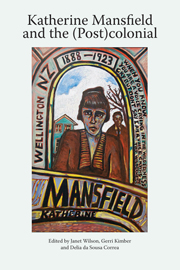Book contents
- Frontmatter
- Contents
- List of Illustrations
- Acknowledgements
- Colophon
- Introduction
- Criticism
- Katherine Mansfield: Cannibal
- Mansfield as (Post) colonial-Modernist: Rewriting the Contract with Death
- Colonialism and the Need for Impurity: Katherine Mansfield, ‘The Garden Party’ and Postcolonial Feeling
- ‘How Katherine Mansfield was Kidnapped’: A (Post) colonial Family Romance
- ‘Unmasking’ the First-Person Narrator of In a German Pension
- Workmanship and Wildness: Katherine Mansfield on Edith Wharton's The Age of Innocence
- Home and Abroad in the South Pacific: Spaces and Places in Robert Louis Stevenson and Katherine Mansfield's Short Fiction
- Literatures of Expatriation and the Colonial Mansfield
- Creative Writing
- Reports
- Reviews
- Notes on Contributors
- Katherine Mansfield Society
Mansfield as (Post) colonial-Modernist: Rewriting the Contract with Death
from Criticism
Published online by Cambridge University Press: 05 March 2014
- Frontmatter
- Contents
- List of Illustrations
- Acknowledgements
- Colophon
- Introduction
- Criticism
- Katherine Mansfield: Cannibal
- Mansfield as (Post) colonial-Modernist: Rewriting the Contract with Death
- Colonialism and the Need for Impurity: Katherine Mansfield, ‘The Garden Party’ and Postcolonial Feeling
- ‘How Katherine Mansfield was Kidnapped’: A (Post) colonial Family Romance
- ‘Unmasking’ the First-Person Narrator of In a German Pension
- Workmanship and Wildness: Katherine Mansfield on Edith Wharton's The Age of Innocence
- Home and Abroad in the South Pacific: Spaces and Places in Robert Louis Stevenson and Katherine Mansfield's Short Fiction
- Literatures of Expatriation and the Colonial Mansfield
- Creative Writing
- Reports
- Reviews
- Notes on Contributors
- Katherine Mansfield Society
Summary
Mansfield's (Post)colonial-Modernism
Mansfield's dualistic positioning, which crosses international modernism with (post)colonial critique, stems from her habitation of multiple, layered states of being, magniied by her various allegiances to, and estrangements from, her New Zealand white settler and English migrant identities. This pluralism enables her great New Zealand stories like ‘At the Bay’, ‘The Garden Party’, and ‘The Dolls' House’, as well as the last stories written from late 1921 to July 1922 (the date of her final story ‘The Canary’), to be located within a (post)colonial-modernist framework. Mansfield represents various images of childhood from her bifurcated positioning through a world view dominated by death and mortality, and a consciousness that goes beyond the invocations of savagery and the spirit of the place in early stories and sketches of New Zealand: for example, ‘Old Tar’, in which hauntings by the dispossessed ‘other’ create atmospheric destabilisation and undermine the settler's ostensible ownership of land; ‘In the Botanical Gardens’, where a hostile emanation in the native bush implies the sense of guilt at white settler intrusion; or in ‘The Woman at the Store’ where the savage spirit of the land roams unchecked at sundown. The white settler point of view is undermined in an aesthetics of narrative fracture in these earlier stories – ellipses, omissions, paradox – whereby ghostly emanations from the past and phantasmagoric presences are constituent of the divided and ruptured condition of colonialism.
- Type
- Chapter
- Information
- Katherine Mansfield and the (Post)colonial , pp. 29 - 44Publisher: Edinburgh University PressPrint publication year: 2013

